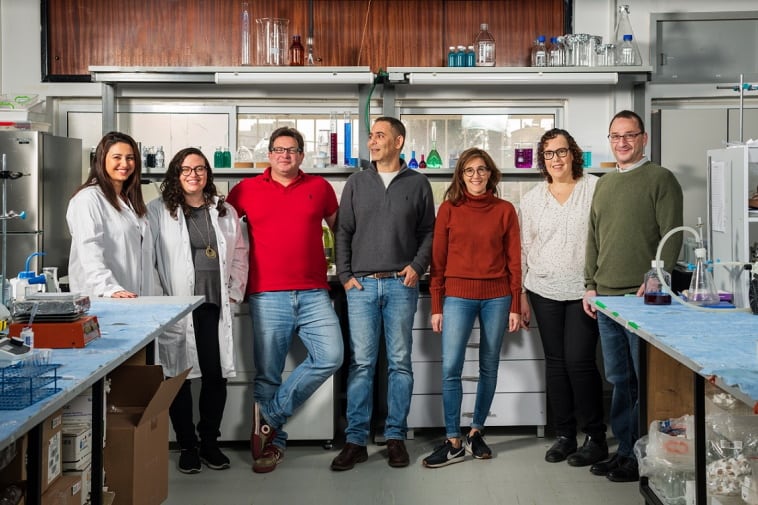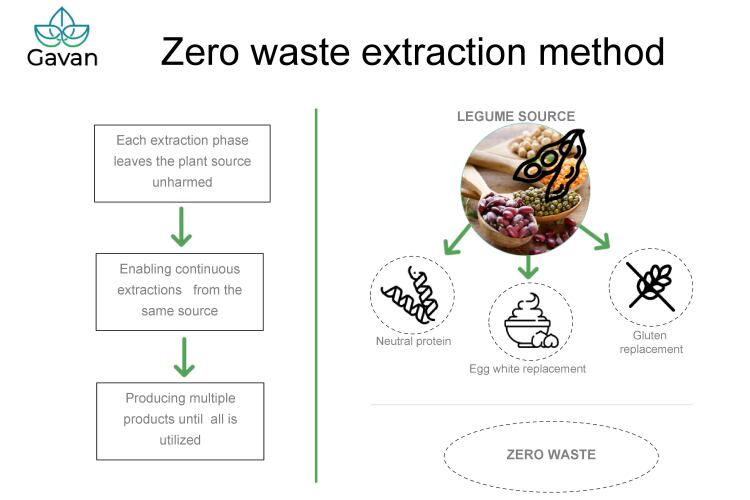Today, extracting proteins and other ingredients from plants often relies on multiphase chemical processes that result in loss of yield and quality at each step. These methods see up to 80% of the plant input wasted or diverted to low-value uses such as compost or animal feed.
The side-stream products that are generated are often low quality and diluted concentration. Energy-intensive separation and drying methods make these costly in terms of environmental footprint and dollar spend.
“The problem is not the source nor the product; the problem is within the process,” according to the assessment of Itai Cohen, CEO and co-founder of food tech company Gavan.
This observation resonates strongly in the plant-based space, an area that is driven by sustainability concerns, but which often fails to utilise plant inputs to their fullest. “Innovation within alt protein production focuses predominantly on finding more exotic sources of protein and processing them into innovative, palate-friendly alternatives to animal proteins. Many of the methods used, however, fail to glean the full value of the plant source in terms of functional components and holistic goodness,” explained Cohen. “They end up wasting valuable raw material.”
Responding to this inefficiency in the food system, Gavan has developed a solution: a novel, waste-free protein extraction method that, it says, utilises 100% of the raw material input.
“We developed advanced methods for protein extraction from inception, and that by design are regenerative. We can exploit all of a plant’s components and explore their functional potential in endless food applications, without imparting any sensory shortcomings,” Cohen explained.

The process, he told FoodNavigator, can be visualised as a continuous loop. “Imagine a process that has multiple repeating steps. Each time we change the environment of the extraction using different materials and conditions to extract different ingredients at varying stages and to receive a different product. This process continues until the entire biomass is consumed. Once we extract and produce a functional ingredient, from the leftover plant mass we will produce another functional ingredient and so forth.
“No part of the plant is left out. Moreover, the proteins maintain their original form—there is no resulting modification to their physical structure. All of the source’s nutritional and functional qualities are fully preserved.”
While Cohen said he couldn’t detail how the process works because ‘it is our trade secret’, he did reveal it uses ‘only natural and edible materials’ and is GMO-free.
Harnessing the ‘versatility’ of every plant
Gavan’s proprietary modification platform harnesses the ‘versatility’ of each plant component’s unique functional characteristics to produce ingredients including: natural colours, protein isolates, flavour enhancers, gluten substitutes, and other useful compounds.
The process requires zero-to-minimal heat, allowing for up to a tenfold reduction in energy consumption.
The start-up has established a pilot trial to extract ingredients from lentils.
The output includes a 92% protein isolate as well as complex carbohydrates, fibre, minerals, and fat. These were converted into a nutritious, neutral-flavoured, non-gluten flour, Gavan detailed. The company also produced a high-functioning, protein-rich emulsifier suitable as an egg white replacer with aquafaba-like abilities.
In other tests, Gavan has successfully derived multiple products from spirulina, including a protein dense ‘vibrant’ blue colouring.
“Spirulina is made up of 70% high-value protein and hosts a naturally rich content of chlorophyll and the bright blue pigment protein complex phycocyanin,” explained Yael Leader, head of product for Gavan. “After extracting the phycocyanin blue colorant, the remaining mass yielded a range of clean-label, protein-based flavour enhancers; a brown colorant offering a better-for-you alternative to the commonly used caramel colorants; residual carbohydrates; and a lipid fraction rich in essential fatty acids and carotenoids.”
Cohen is confident the approach can be applied to any plant protein source. “We have been working mostly with legumes and algae so far. We believe there is an endless variety of plants to work with versatile traits,” the food tech innovator told us. “We intend to continue broadening into other plants as well.”

This unlocks numerous possibilities in ingredients development. “The ingredients we get out has a direct relation to the source and different sources will result in different ingredients. We get a different set of ingredients from different sources. There are many similarities within legumes, but they are different in their properties and functions. We know how to identify the properties and understand what applications it will best serve.”
Meeting the need for circular solutions
Gavan has developed the right solution, at the right time, Cohen believes. In addition to the economic incentive of valorising materials that are currently wasted, Gavan’s technology has a strong sustainability story to tell.
Over the last ten years, the start-up founder observed, food industry players have been shifting their industrial processes towards ‘more sustainable standards’.
“They have actively been striving to align their operations to meet the European Commission’s Green Deal call for greater resource efficiency in response to consumers’ efforts to adopt more sustainable lifestyles. Consumers want to know how their food is manufactured, where the ingredients come from, and what is the environmental footprint of the products they are buying.”
He believes Gavan’s technological approach to utilising the entire plant strikes a chord with these trends and could help the food industry produce more food using fewer natural resources, a key objective if it is to meet the nutritional needs of a growing global population.
While still under development, Cohen expects Gavan’s extracted products to begin a gradual market rollout in 2023.
“Our technology signifies a paradigm change, demonstrating how focusing on sustainable and circular production enables higher efficiencies and presents a better economic model. This, for Gavan, defines a true, positive ecological—and economical—impact and makes sustainability profitable.”



